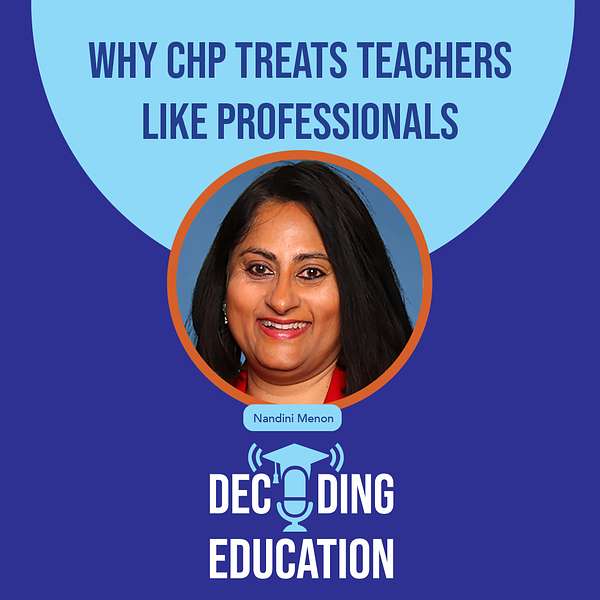
Decoding Education
Decoding Education
Why CHP treats teachers like professionals
At CHP, "best practices" are iterative and teaching is collaborative.
On this episode:
- Bringing best practices from the ivory tower into the classroom
- The CHP pedagogy
- A collaborative environment for teachers
Decoding Education is the podcast that brings together research, experience, and community voices to answer your burning questions about preschool through grade eight education. Brought to you by Cedar Hill Preparatory School in Somerset, New Jersey.
Please subscribe and leave a review!
Learn more about Cedar Hill Prep
Schedule a campus tour school today!
Nandini Menon:
Hello and welcome to another episode of Decoding Education from Cedar Hill Preparatory School in Somerset, New Jersey, the podcast that brings together research, experience, and community voices to answer your burning questions about preschool through grade eight education. I'm Nandini Menon, a textile engineer turned education advocate, and the founder of Cedar Hill Prep School. Since starting the school in 2003, we've grown from a handful of students to nearly 300 by leveraging the most up to date research on teaching best practices, prioritizing individualized instruction, and fostering a tight knit community of learners and their families.
We adults have to really consider education a social responsibility. So there are all these theoretical paradigms, and there's a lot of research that comes out. It is our job in educational institutions to look at our children, the audience, and see, does that theory pan out? There are some things you will know intuitively just based on experience. And there's a lot we can learn based on research that's done in research institutions, and, you know, reading the output.
For example, the IES and What Works Clearinghouse. These are all people who put out best practices out there, for teachers in our country to just go and find evidence that look, nine out of 10 schools declared that this really worked for them. So you borrow from that. I will tell you that luckily, at our school, we will- if we like certain curriculums we always beta test it. We test it against textbooks, like original old ways of teaching, then we look at the new things we are learning. And then all of us teachers say, “Okay, let's beta test it.” And then we examine learning outcomes for the kids. Which combination or which method really had the students show us visible learning outcomes?
And we came up with a pedagogy of how we would teach vocabulary first, then we would teach the content. And then we would engage in either Socratic practices, debate and dialogue, where the students are actually explaining their thinking. They are understanding their peers' thinking, and their and then the teachers have these targeted questions. And in the end, we're all learning together. So the classroom may look very noisy, but it's noisy, with rich discussions. It's noisy, with critical thinking. It's noisy with action, because children are just so excited to share what they know, argue with the others as to who understood better than the other. So there's a new key word that's being used in education called a flipped classroom. A flipped classroom is where the teacher is observing and listening to make their instruction better for the next lesson based on all the visible dialogue in the class, and to me, that's opening the faucet of every young child's brain. And you can just sit and marvel at this beauty.
Tori Marchiony:
And the teachers who are prepared to be responsive, who are trained enough, and flexible enough to actually be able to diagnose in real time what is needed, and to listen, feels very rare.
Miss Nan:
So if you talk to any of my teachers at Cedar Hill Prep School, the first thing they say is- especially new teachers who come and there's enough, like we- I have reflection posts from all of them. Because for me, I know no better. This is how I would want them to be where each of us borrows from each other and we therefore become better at our own game. And they feel this is the first place they were treated like a professional. This is the first place where their thought matters. Their opinion matters. And all of us seem to be so similar. We feed off each other's ideas. So there are times when I go sit in their classroom and I'm like, “Oh, that is such a great idea. I'm gonna copy it.” And that's when you realize if you have 50 teachers, you are learning 50 different ways of teaching. But for that we need to empower the teacher and we need to empower the student. And then you can see magic happening.
Thank you for listening, and be sure to tune in next time. If you're considering a private preschool through grade eight education for your child, your next step is finding the school that's the best fit for their specific needs. And the best way to do that is to get on campus for a tour. Cedar Hill Prep is currently enrolling for the 23-24 academic year, so be sure to check out the link in our description to sign up for an open house, or call 732-356-5400 to book a private campus tour with CHP’s admission director, Miss Donna Jones. We can't wait to meet you. So until next time, this has been Decoding Education from Cedar Hill Prep School. Thank you for listening!